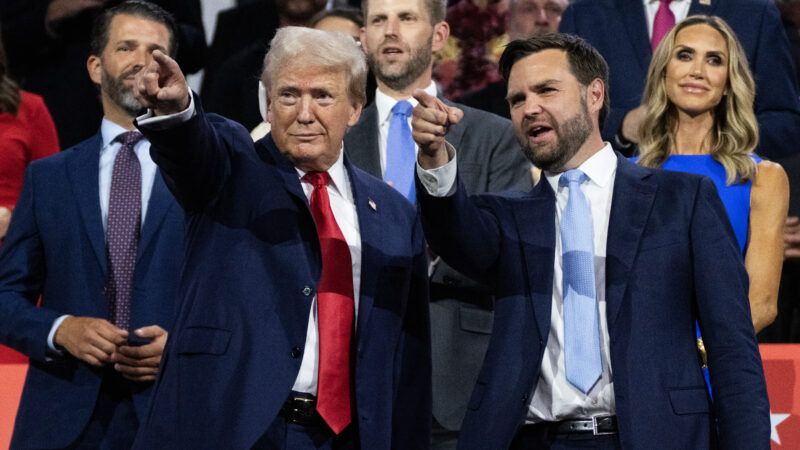J.D. Vance Completes Trump's Ideological Takeover of the Republican Party
Trumpism, not Reaganism, is the doctrine of the Grand Old Party for the foreseeable future.

There is an old political critique of Donald Trump, perhaps understandable, that the 45th and favored 47th president of the United States has no ideology, that the Republican turned independent turned Democrat turned Republican turned independent turned Republican is an incoherent and opportunistic ragbag of selfish impulses and populist punchlines.
But Trump's selection Monday of 39-year-old Sen. J.D. Vance (R–Ohio) to be his 2024 vice presidential running mate cements an alternative reality that many have been slow to recognize: "Make America Great Again" is no longer—if it ever was—just a slogan on a hat, but rather a decadelong philosophical transformation of the Republican Party from rhetorical proponent of free markets, entitlement reform, and Pax Americana to protector of the entitlement state against immigration and the working class against the globe-straddling corruption of elites.
Asked Monday night at the Republican National Convention (RNC) by Fox News host Sean Hannity about his readiness to step into the presidency if need be, Vance said "I have the vision and the agenda aligned with President Trump to make the American worker better off, bring peace to the world, and to actually advance the agenda that's good for American citizens….As successful as he was politically, even after he was elected, certain Republicans didn't want to actually enact the America First agenda."
Many commentators over the past day have stressed this loyalty aspect, never failing to point out Vance's harsh 2016 words for Trump, back when he was still a celebrated young author and not a United States senator. But Vance's Hillbilly Elegy was, if not exactly a Trump 2016 blueprint (having come out only that summer), a harbinger of a new type of Republican political emphasis, focusing on blue-collar dysfunction and the plight of the forgotten man.
The GOP's new work clothes were on startling display during Monday night's keynote RNC speech, by International Brotherhood of Teamsters President Sean O'Brien. Watching star-spangled delegates enthusiastically cheer on a union boss stumping against right-to-work laws, bashing Amazon and the Chamber of Commerce, and decrying "American workers being sold out to big banks, big tech corporations, [and] the elite," well, this is not your father's (or grandfather's) Republican convention.
As political pollster and author Patrick Ruffini argued to Nick Gillespie in March, Trump has been the primary change agent in a realignment of America's two major political parties. "Specifically, it flipped after 2016," Ruffini said, "when Democrats really seemed to [begin to] have a lot of trouble holding on to the broad mass of working-class voters, which are today defined as voters without college degrees."
The Vance pick is a transparent attempt to lock in those gains. "I think he has working-class appeal," Trump ally Roger Stone told USA Today. Trump in his Truth Social announcement praised the senator for championing "the hardworking men and women of our Country."
While some of the working-class partisan shift is more about culture and vibes—as Ruffini put it, Trump's new fans "saw a certain authenticity, and they saw somebody who spoke like them, somebody who was angry at the same people that they were angry at"—there are concrete policy implications as well.
Vance is perhaps the GOP's leading practitioner of responding to questions about Russia's invasion of Ukraine by pivoting to Mexico and fentanyl. "What are we talking about?" he asked at a voter forum in February 2022 as the invasion was imminent. "We're talking about a border 5,000 miles away between Ukraine and Russia. That's what our leaders are focused on. If we had leaders half as concerned about their own border as they were about the Ukraine-Russia border, we would not have a border crisis in this country."
This aspect of Trump's GOP was also on display Monday in Milwaukee, particularly in the awkward speech of technology investor David Sacks. President Joe Biden, Sacks proclaimed, "provoked—yes, provoked—the Russians to invade Ukraine with talk of NATO expansion." The result: "Russia's military is bigger than before, while our own stockpiles are dangerously depleted. Every day, there are new calls for escalation, and the world looks on in horror as Joe Biden's demented policy takes us to the brink of World War III."
Again, this is not your father's GOP.
Vance, as Reason's Robby Soave detailed last week, is a proponent of raising the minimum wage, banning TikTok, and enacting some form of national service. The would-be veep "embraces tariffs and protectionism. He has called for the federal government to break up Google. He has even praised Federal Trade Commission Chairwoman Lina Khan, a Joe Biden appointee waging a one-woman crusade against major tech companies—and indirectly, their customers."
On some of these issues, Vance has struck an even more America First position than the man who repopularized that political slogan. Which underlines the point: Unlike some of his competitors in the veepstakes, such as Sen. Marco Rubio (R–Fla.), Vance is more of a true believer, or at least sincere-seeming transmitter, of that collection of policy impulses we might call Trumpism.
In that, the GOP presidential nominee is displaying some ideological confidence. "Balancing" the ticket? No, Trump is, as Reason's Stephanie Slade observed Monday, "doubling down." Selecting an articulator of MAGA half his age will help Trump accomplish what few people could have ever predicted in July 2015: Change the meaning of the word "Republican" for an entire generation. Trump may or may not make America great again, but he sure is making the GOP nationalist.


Show Comments (191)